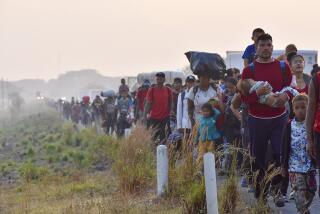Book review: ‘The Newlyweds’ gives uncanny take on immigrant dream
The Newlyweds
A Novel
Nell Freudenberger
Alfred A. Knopf: 342 pp., $25.95
Two-thirds of the way through Nell Freudenberger’s second novel, her Bangladeshi narrator, Amina, wonders, “Why were some people attracted to what was unfamiliar, and others to what they knew?”
Amina, born into a Muslim family in Haibatpur, her grandmother’s village, falls into the first category. Since girlhood, Amina has studied English and forged a determined path toward the U.S. At the beginning of “The Newlyweds,” she has been married for six months to George, a methodical and bland electrical engineer she met on the dating website AsianEuro.com. She is adjusting, sometimes quizzically, to life in Rochester, N.Y., a land of unfamiliar fierce winters, Home Depots, cul-de-sacs and opaque in-law relationships.
Freudenberger’s own cross-cultural affinities showed up in her accomplished first collection, “Lucky Girls” (five stories set in India, Vietnam, Thailand and other parts of Southeast Asia), and in her first novel, “The Dissident,” about a Chinese performance artist who spends a disorienting year in residence at a girls’ school in Los Angeles.
When an excerpt from “The Newlyweds” appeared in the New Yorker’s “20 Under 40” fiction issue in 2010, Freudenberger explained that the story was inspired by a young Bangladeshi Muslim woman she met on an airplane who was flying to Rochester to marry a man she had met on the Internet. This nugget gives background, but the novel succeeds based on Freudenberger’s uncanny ability to feel her way inside Amina’s skin as she takes courageous, self-sacrificing steps toward realizing her dream.
Amina arrives in Rochester in March 2005 with a three-year game plan: (1) marry George, (2) get her green card, (3) land a job and send money home to her parents, (4) become a U.S. citizen, and 5) sponsor her parents’ immigration. With help from George, she begins her studies at the local junior college. Her marriage is, in its own way, as pragmatic as an arranged marriage might have been but based on the economic advantages of immigration rather than traditional familial ties.
George moves in and out of the plot (and of Amina’s bed) in ways that are not always convincing. He comes alive most when he speaks of his wish for a family, which makes even more poignant Amina’s concern that, after more than a year of trying, she may be unable to conceive.
More successful are two other star-crossed characters who crisscross cultural divides. Nasir, the man Amina might have married — he’s the son of her father’s oldest friend, a fellow freedom fighter in the war of liberation against Pakistan — leaves Dhaka to live in London. Feeling marginalized there, he ultimately returns to his family home in Bangladesh and begins sending Amina touching emails: “Walking down the lane to your parents’ home, I was thinking of past-Munni and present-Munni, trying to make a bridge between the two.”
Kim, George’s adopted cousin, is drawn to India. She studied yoga there and married Ashok, the son of a wealthy Bollywood director. Ashok went back to India after the Sept. 11 attacks (every time he took a backpack on the subway, everyone stared at him), and Kim returned to Rochester to teach yoga, modifying Indian dress, diet and religion with an enthusiasm Amina finds “genuine if not well-informed.”
Amina is a precocious observer of detail, acutely monitoring her new environment. When George speaks of the “thugs” who vandalized their mailbox, she translates for herself: He means “kids, troublemakers from East Rochester High, not dacoits — the bandits who haunted the highways back home.” It takes her at least a year to understand sarcasm — “to catch the tone in George’s voice that meant he was saying the opposite of what his words suggested.” When she gets her first job, she explains to a co-worker that Dhaka, Bangladesh, is “near India — and China.”
In the last third of the novel, as this dutiful daughter returns to Dhaka to bring her parents to Rochester, Freudenberger shows how once familiar people and places have been transformed by Amina’s American life. “You thought you were the permanent part of your own experience, the net that held it all together,” she writes, “until you discovered that there were many selves, dissolving into one another....”
In a series of surprising and riveting scenes, Amina’s lingering attraction to Nasir and the dangers of her father’s family’s claims put everything at risk that she has worked toward. Caught between worlds, Amira begins to know herself, and to understand the inevitable limits of her choices. For all its global sophistication, the most remarkable accomplishment of this hugely satisfying novel is Freudenberger’s subtle exploration of the stage of adulthood at the heart of “The Newlyweds,” and all the compromises with selfhood those early years of love and marriage entail.
Ciabattari’s reviews have appeared in many publications, including the New York Times Book Review, the Boston Globe, the Daily Beast and NPR.org.
More to Read
The biggest entertainment stories
Get our big stories about Hollywood, film, television, music, arts, culture and more right in your inbox as soon as they publish.
You may occasionally receive promotional content from the Los Angeles Times.






